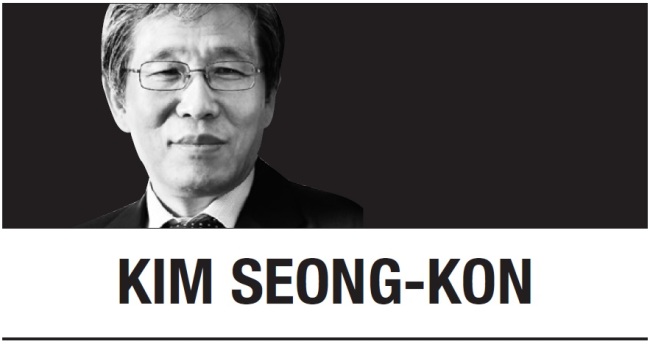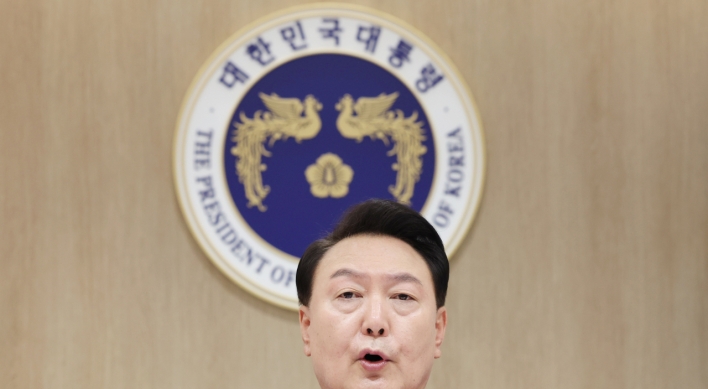[Kim Seong-kon] Korea caught between Scylla and Charybdis
By Kim Seong-konPublished : Aug. 15, 2017 - 17:44
 Recently foreign readers wrote me that they would like to know what young Koreans think of the current political climate of the Korean Peninsula and what South Korea can and should do under the circumstances. In their eyes, Korea is now helplessly caught between a rock and a hard place.
Recently foreign readers wrote me that they would like to know what young Koreans think of the current political climate of the Korean Peninsula and what South Korea can and should do under the circumstances. In their eyes, Korea is now helplessly caught between a rock and a hard place. I conversed with young Koreans only to be disappointed by their indifference and apathy. Their primary concern was to find a decent job and live comfortably in material abundance. As for national security, they seemed to think that it is not so much their concern as the older generation’s or as the problem of North Korea and the United States. Indeed, one of my American friends wrote me lately, “And the Korean population has for a long time turned a blind eye to the North and viewed this as somehow an American problem while they pursued a very materialistic Western lifestyle.”
I also found that young Koreans had little knowledge of communism or the Korean War. My American friend in the States aptly pointed out the problem: “Have you ever tried to discuss the Korean Peninsula situation with a young South Korean student? It is both shocking and depressing, and difficult too because the ones I talk to here have little knowledge of the history of their country that brought them/us to this place.” Surely, not all young people are like that, and yet the ignorance of South Korean youngsters about their country’s past is disheartening and appalling.
The older generation, too, is surprisingly calm. They do not particularly seem to be alert to the impending clash between North Korea and the States. Perhaps the Korean people have been living with crises so long that they have become numb to any threats whatsoever. Perhaps that is why they continue to go on vacations, purchase condos, and invest in the stock market, while the whole world watches them anxiously. Some older people are still engaged in internal power politics and factional skirmishes, not knowing that dark clouds are approaching them. Meanwhile radicals doggedly oppose the deployment of the Terminal High Altitude Area Defense system.
What, then, can and should South Korea do in this bleak situation? Unfortunately, there seems to be nothing much that it can do. South Korea is hopelessly caught in the vortex of international crisis. The problem is that in the eyes of other nations, “Korean politicians have not distinguished themselves in how they have managed relations with their northern brothers,” as my American friend puts it. If North Korea refuses to talk, we should persuade Washington, together with Japan, if possible, not to resort to military options which would be disastrous to South Korea and possibly even Japan because of North Korea’s retaliation.
Recently, Jeffrey Bader at the Brookings Institute published an article titled, “7 Approaches that won’t work.” The situation sounded like there was no viable option left and we were at a cul-de-sac. But Bader proposed an approach that might work: “deterrence and containment.” Bader wrote, “Short-term fixes are the wrong approach. Instead, the United States and its allies should prepare an assertive policy of deterrence and containment of North Korea.” Previously, the deterrence and containment policy worked for the Soviet Union. Perhaps it will work for North Korea too.
The first one among the “7 approaches that won’t work” is “a pre-emptive strike or preventive war.” Bader warns that such a military option will invite “devastating retaliation by North Korea against South Korea and perhaps Japan.” He predicts that approximately 15,000 long-range artillery launchers will strike Seoul, causing millions of casualties, including approximately 200,000 US citizens residing in Korea as well.
Experts also cast a doubt on the credibility of the US intelligence agencies’ reports. Many sources say that North Korea has not been able to perfect the heat-shield skill to protect the intercontinental ballistic missiles upon re-entry and perhaps even miniature nuclear warheads yet. However, if the States is played by North Korea’s provocation, the Korean and American people may get dragged into war once again out of fear of non-existent weapons of mass destruction.
Currently, South Korea is navigating precariously through Scylla and Charybdis. If the States takes North Korea’s bluff too seriously and attempts “preventive war,” South Korea will be shipwrecked due to the North’s retaliation. If the States succeeds in negotiating with China and North Korea, South Korea will still be in danger of being capsized because undoubtedly it may be South Korea that will be a bargaining chip for their negotiation. We are worried that the States would not want to protect South Korea at the cost of major American cities.
Experts speculate that there is a strong possibility that the States will draw the second Acheson Line eventually. If so, the Korean Peninsula is likely to be excluded from the line once again. We know what happened when the States had announced the first Acheson Line; the result was so costly, even for the US. As the TV show “Game of the Throne” says, “Winter is here” already, and the South may need to prepare for the arrival of the Northern army.
Kim Seong-kon
Kim Seong-kon is a professor emeritus of English at Seoul National University and president of the Literature Translation Institute of Korea. He can be reached at sukim@snu.ac.kr. -- Ed.


















